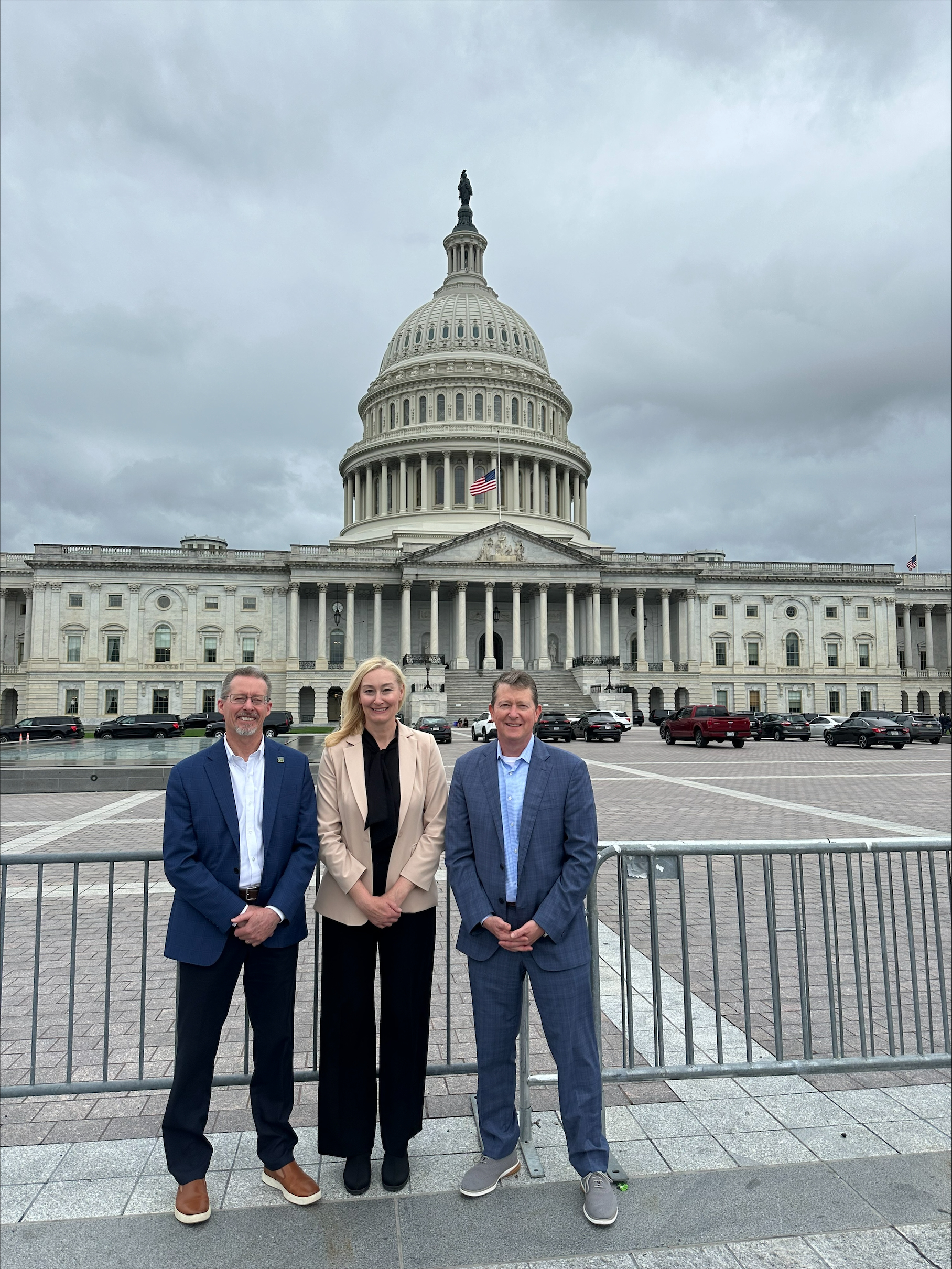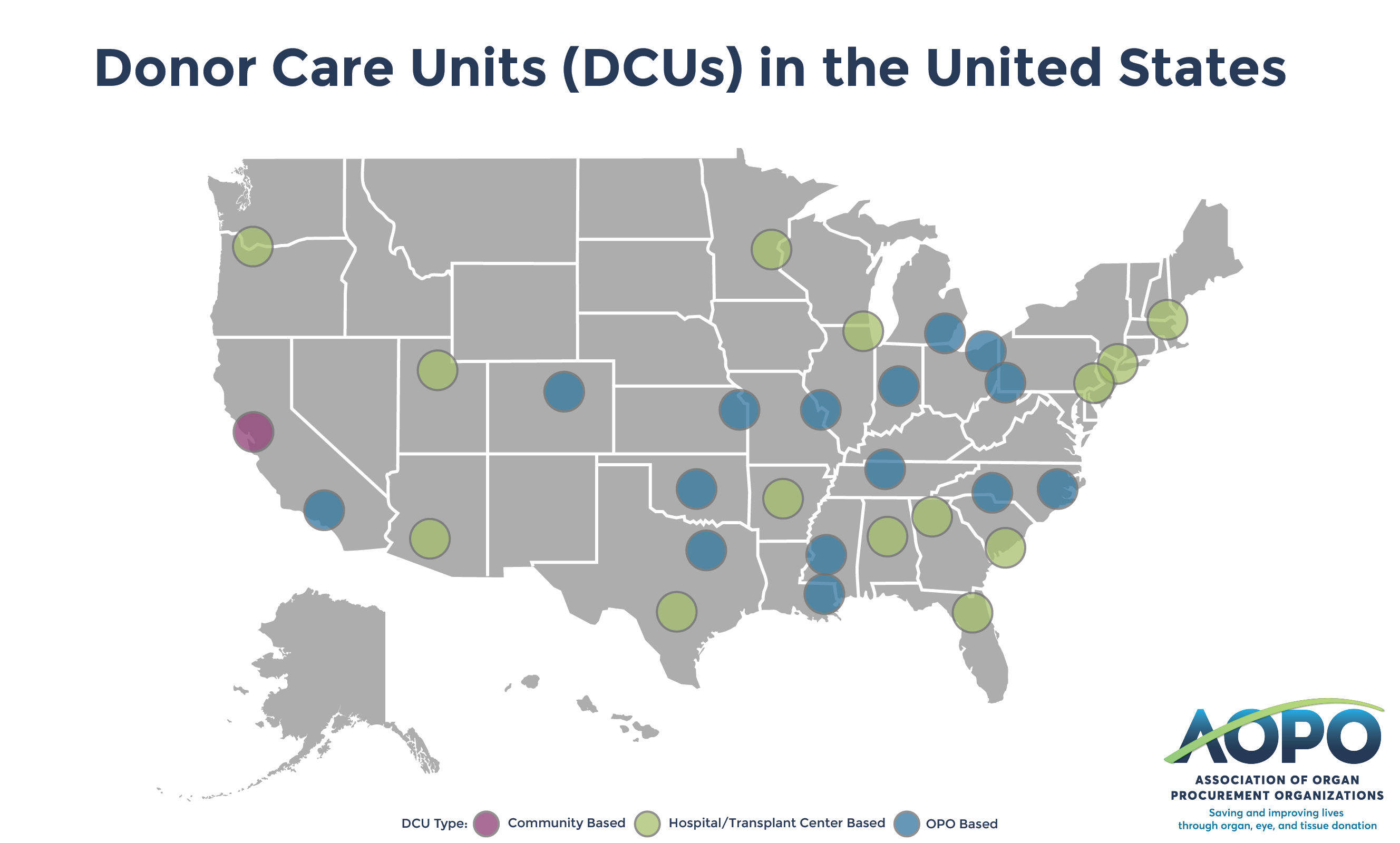Advocating for Advancements in Donation & Transplant
On May 15, members of the Association of Organ Procurement Organizations (AOPO) gathered on Capitol Hill in Washington, D.C. to connect with legislators and staff regarding the life-saving mission of OPOs. The fly-in event provided an opportunity for AOPO members to showcase their impactful work and efforts to achieve our goal of 50,000 organ transplants in 2026. It also served as a platform to advocate for critical issues of importance to the OPO community, including questions about CMS implementation of the OPO Final Rule and incentivizing the use of Donor Care Units (DCUs).

Pictured: Barry Massa, AOPO Immediate Past President, Colleen McCarthy, AOPO President, Steve Miller, AOPO CEO
CMS OPO Reform: Pending Guidance
The 56 OPOs in the United States are recertified by CMS every four years. In 2021, CMS finalized regulations that dramatically changed this certification process, making it highly likely a significant number of OPOs will be decertified regardless of performance improvements. This will trigger a poorly defined competitive process in which some remaining OPOs can elect to take over the decertified entity’s donation service area.
CMS has not provided guidance on many questions regarding this process and has yet to produce clarifying regulations to address several concerns with the new approach. With the decertification of OPOs based on 2024 performance looming in 2026, time is running out to address these issues and avoid the forced closure of many OPOs, which could lead to widespread disruption in the world’s leading organ donation and transplantation system.
The most recent CMS preliminary performance report showed that despite steady and pronounced year-over-year improvement, 42% of OPOs would have been automatically decertified under the new metrics. There is no comparable decertification scheme applicable to any other participant in the U.S. healthcare system. Moreover, there are numerous unanswered questions regarding how this program will be implemented, leaving fundamental aspects of the re-competition and transition process unresolved.
In response to a letter from 44 members of Congress on November 3, 2023, CMS demurred on the need for guidance and instead stated they are in a rulemaking process. Additional uncertainty was introduced in the Biden Administration’s Fiscal Year 2025 budget proposal, which requested Congress provide CMS with the authority to certify new entities to serve as an OPO, including the possible inclusion of for-profits into the system. These actions are concerning given the timeframes involved in implementing new rules or legislation and the impending decertification.
While in DC, OPOs urged members of Congress to reach out to CMS to request a specific plan to address issues with the new competition and decertification process, explain how it will be administered, and reconcile these steps with the looming implementation date. Legislators and staffers were asked to communicate with CMS leadership through the Office of Legislation or other appropriate channels.
Donor Care Units (DCU): Addressing Roadblocks
OPOs coordinate donor management, organ allocation, and procurement operations within their designated service areas, working closely with donor hospitals. To optimize organ recovery and transplantation, many OPOs have established DCUs. These units are either standalone facilities or dedicated spaces within hospitals, specifically staffed and equipped for managing and recovering organs. Evidence shows DCUs enhance the outcomes of organ recovery and transplantation, improve the experience of donor families, and provide greater economic efficiency.

However, the Medicare reimbursement process for organ recovery is complex and creates disincentives for transferring donors to a DCU when the donor hospital is also a transplant center. If a deceased donor is transferred to a DCU, the transplant center loses reimbursement for organ recovery, and the organs procured are not counted towards the donor hospital’s Medicare organ ratio, resulting in financial penalties for the transplant centers.
To address this, two key changes are needed: allowing modifications in the transplant center’s cost report to include costs incurred before transferring a donor to a DCU and transportation costs and allowing the donor to be counted on the transplant center’s cost report. During AOPO Advocacy Day, members requested congressional support in prioritizing DCUs and exploring opportunities to clarify CMS cost reporting rules through agency engagement and legislation.
Congressional Organ and Tissue Donation Awareness Caucus
The Congressional Organ and Tissue Donation Awareness Caucus is dedicated to increasing organ and tissue donation across the United States. This active caucus serves as a platform for members of Congress and their staff to gain insights into organ and tissue donation and transplantation. It aims to support, promote, and encourage organ and tissue donation on a national scale. By playing a vital role in education and the advancement of policy initiatives, the caucus helps enhance donation and transplantation, ensuring equitable access to these services. As part of AOPO Advocacy Day, OPOs urged Members of Congress to join the bipartisan Organ and Tissue Donation and Transplantation Awareness Caucus to increase awareness and support for these crucial initiatives.
Conclusion
By building relationships with Congress and advocating for these issues the OPO community enhances the organ donation and transplantation system, ultimately saving more lives. AOPO remains engaged with federal policymakers to address these, and other concerns, to ensure the continued success of our system.
Thanks,
Steve Miller, MBA, CAE
AOPO CEO


